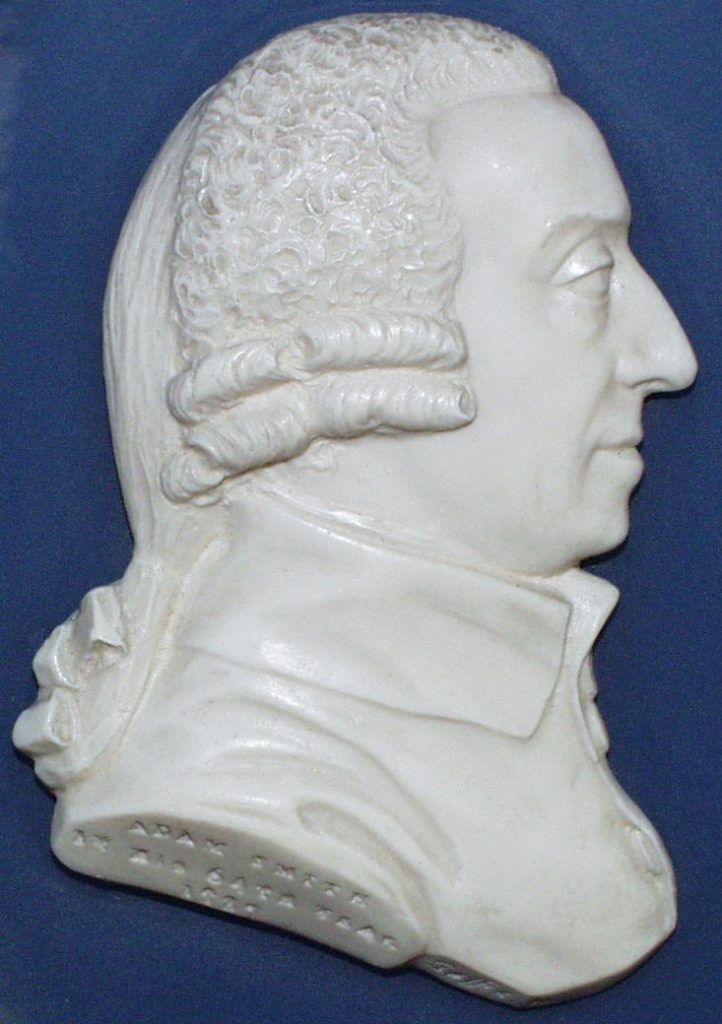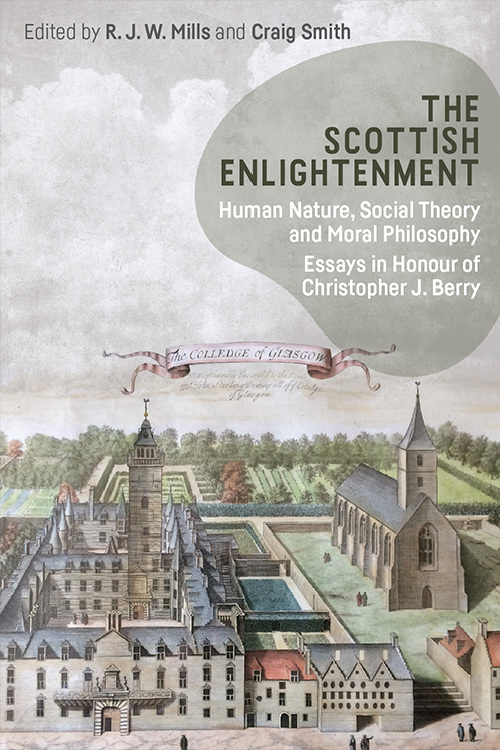
by Craig Smith
2023 is the 300th anniversary of the birth of Adam Smith.
Smith is one of the very few writers whose name is genuinely famous all over the world. He is known as the father of economics, the man who initiated the study of the modern economy and who defended markets and economic development. But Smith was much more than this.
He was a Professor of Moral Philosophy at The University of Glasgow. He wrote widely on moral psychology, ethics, politics, jurisprudence, history, linguistics, and rhetoric. At the same time, he maintained interests in natural science, mathematics and geometry. He corresponded with, and met, the leading figures of the European Enlightenment, and his books were hugely influential in the American Enlightenment.
The breadth of Smith’s interests should come as no surprise once we realise that he was a member of the Scottish Enlightenment – that outpouring of intellectual and cultural brilliance that brought Scotland to the forefront of European civilization in the second half of the eighteenth century.

The University of Glasgow)
Smith was very much a man of the Scottish Enlightenment. He was educated at Glasgow by Francis Hutcheson, the ‘father’ of the Scottish Enlightenment, and Robert Simson, the noted mathematician. His closest friends were the scientist and discoverer of carbon dioxide Joseph Black and the founder of modern geology James Hutton. Smith’s great intellectual inspiration was his friend David Hume. Hume sat at the centre of a network of clubs and societies which, together with the Kirk, Universities, and Law, formed the core of Enlightenment in Scotland.
The term Scottish Enlightenment means more than just what happened in intellectual circles in eighteenth century Aberdeen, Edinburgh, and Glasgow. The movement had its own focus and that was the idea that we could use the new scientific method to understand the nature of society. The Science of Man, as Hume called it, was at the heart of the Scottish Enlightenment. The idea that we could use history and the evidence gleaned from looking at our own societies to learn how society operated. We could become social scientists, and once we had done this we could put that knowledge to use in the pursuit of what the Scots called Improvement. Their aim was to make Scotland a better place: a wealthier society, a society with higher livings standards where an educated population could explore science, culture, and the arts.
This group of brilliant thinkers, people like Henry Home, Lord Kames; William Robertson, Hugh Blair; Adam Ferguson; John Millar and Thomas Reid focused their attention on understanding the human mind and the political and legal institutions of human societies.

Adam Smith by John Kay
(Photo courtesy of
The University of Glasgow)
At the center of this effort was Adam Smith, whose two great works, The Theory of Moral Sentiments (1759) and An Inquiry into the Nature and Causes of the Wealth of Nations (1776), are the pinnacle of the Scottish attempt to understand human social life in its moral and economic aspects. Smith’s project was to use the observation of how human beings actually behaved as the basis of his attempt to understand how society operated. Rather than allow his judgment to be clouded by ideas of how humans should live and what society might look like, Smith focused on understanding the dynamics of human interaction, the springs of human nature that make us, at times, sociable and, at times, self-interested. Smith thought that he would be better placed to advise on the reform of society if his ideas were based on an understanding of the nature of humans and their life in society.
His most famous book, the Wealth of Nations, is an analysis of how a modern commercial society operates through trade and the division of labour. But it is also a book that advises statesmen on the basis of that analysis. Smith’s account of the operation of commerce led him to be suspicious of corporate interests seeking monopolies; to attack the idea of colonial empires; and to see the inefficiency and immorality of slave economies. Good social science could inform good policy to improve society. A lesson that is as vital now as it was when Smith and his colleagues were enlightening Scotland in the eighteenth century.
In 2023, we celebrate Adam Smith’s place in the Scottish Enlightenment and the achievements of this quiet, modest scholar from Kirkcaldy. His alma mater The University of Glasgow will host a series of events through the year, with a special programme around the first week in June when Smith was Christened.
For more on the Scottish Enlightenment
- Berry, Adam Smith: A Very Short Introduction from the Scottish Historical Review
- Adam Smith and Rousseau: Ethics, Politics, Economics (Edited by Maria Pia Paganelli, Dennis C. Rasmussen, and Craig Smith)
- Craig Smith, Adam Ferguson and the Idea of Civil Society: Moral Science in the Scottish Enlightenment from the Journal of Scottish Philosophy
Craig Smith at the Aye Write Festival

Book your ticket
Thursday 25 May 2023, 6-7pm,
The Mitchell Library, North Street, Glasgow
Craig Smith will be appearing at Glasgow’s Aye Write book festival to discuss the Scottish Enlightenment and explore its impact on our own world in the year of the 300th anniversary of Adam Smith’s birth.
About the author
Dr Craig Smith is the Adam Smith Lecturer in the Scottish Enlightenment at The University of Glasgow. His research is focussed on the moral and political thought of the Scottish Enlightenment. He is the author of Adam Smith’s Political Philosophy: the invisible hand and spontaneous order (Routledge) and Adam Ferguson and the Idea of Civil Society (Edinburgh), and co-editor of The Oxford Handbook of Adam Smith and the second edition of The Cambridge Companion to the Scottish Enlightenment.





